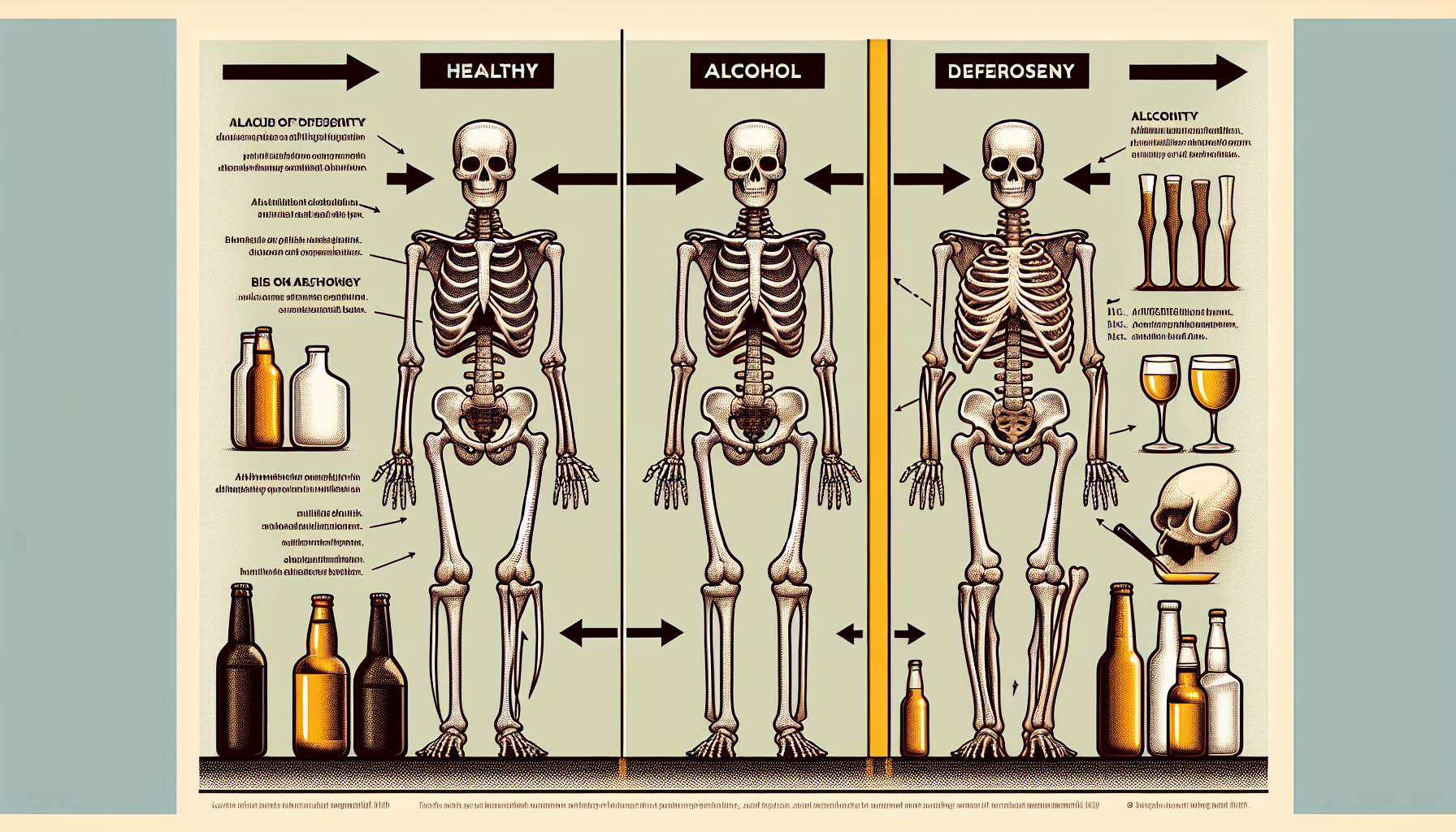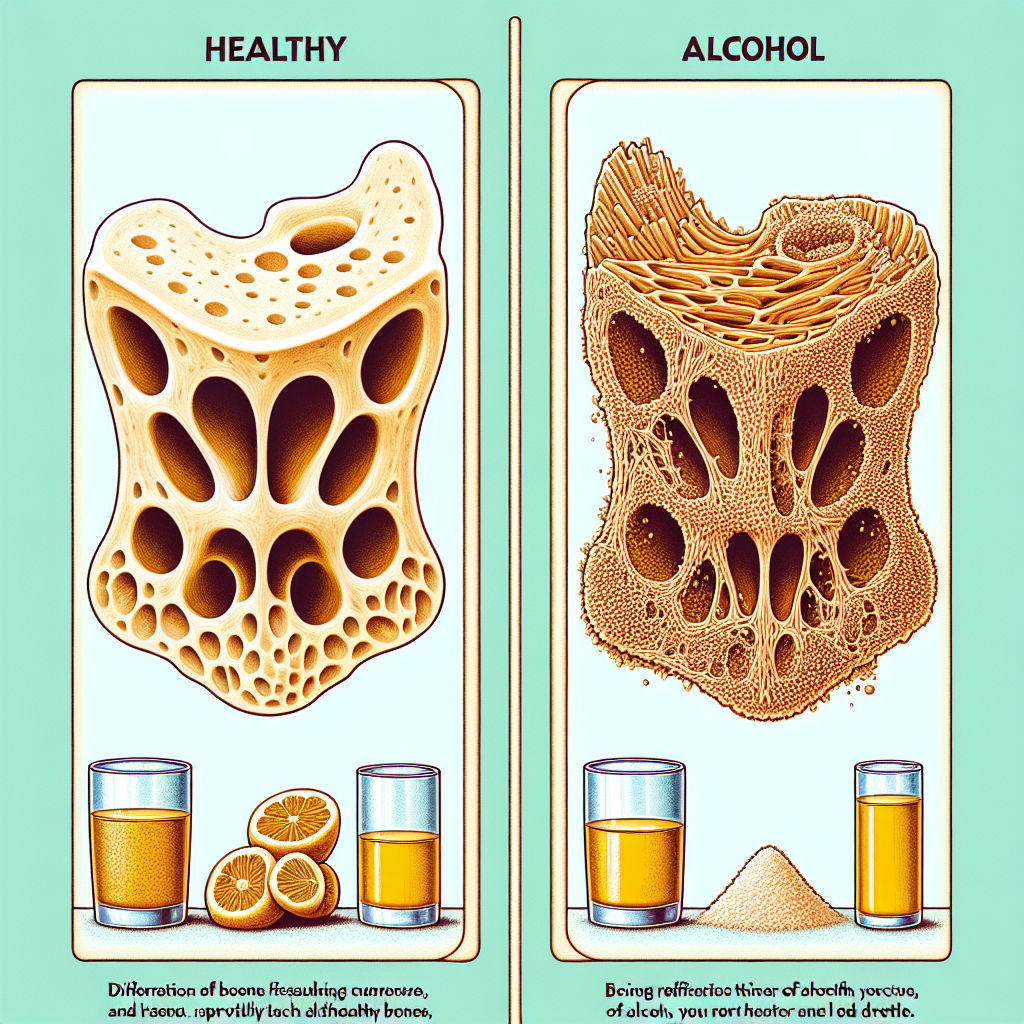Alcohol consumption is a widespread social habit, but its impact on various aspects of health has been a subject of medical research for decades. While moderate drinking may have some health benefits, excessive alcohol intake is known to have detrimental effects on multiple body systems, including the skeletal system. This article delves into the complex relationship between alcohol consumption and bone health, elucidating the mechanisms through which alcohol affects bone density, strength, and overall health.
Understanding the Skeletal System
The human skeletal system is a dynamic structure, continually undergoing a process called bone remodeling. This involves the resorption of old bone tissue by cells known as osteoclasts and the formation of new bone tissue by cells called osteoblasts. Bone health is contingent upon the balance between these two processes, ensuring that bone density and strength are maintained throughout an individual’s life.
Numerous factors influence bone health, including genetics, diet, physical activity, hormonal levels, and lifestyle choices. For comprehensive information on bone health, the article "Bone Health" provides an extensive overview.
Alcohol’s Impact on Bone Remodeling
Alcohol consumption, particularly when excessive, can disrupt the delicate balance of bone remodeling. It exerts a toxic effect on osteoblasts, impairing their ability to form new bone, and can also enhance the activity of osteoclasts, leading to increased bone resorption. This dual impact can result in a net loss of bone density over time, making bones more susceptible to fractures and other injuries.
Hormonal Disruptions
Alcohol has been shown to interfere with the hormonal regulation of bone metabolism. It can lower levels of estrogen and testosterone, hormones that are crucial for maintaining bone density, particularly in postmenopausal women and older men. For a deeper understanding of hormonal influences on bone health, consider reading "How Hormones Affect Your Bone Density."
Nutritional Deficiencies
Excessive alcohol intake often leads to poor nutrition and deficiencies in essential bone-building nutrients such as calcium, vitamin D, and magnesium. These deficiencies can compound the negative effects of alcohol on bone remodeling processes. The connection between diet and bone health is further explored in the article "The Link Between Diet and Bone Health."
Lifestyle Factors
The lifestyle of individuals with high alcohol consumption often includes other habits that are harmful to bone health, such as smoking and physical inactivity. These factors can exacerbate the negative effects of alcohol on the skeleton. To learn more about how lifestyle choices impact bone health, "Impact of Lifestyle on Bone Health" offers valuable insights.
The Risk of Fractures
One of the most significant risks associated with compromised bone health due to alcohol consumption is an increased susceptibility to fractures. Bones weakened by alcohol-induced osteoporosis break more easily, and the healing process can also be hampered by alcohol’s negative influence on bone regeneration.
Studies and External Resources
Research has consistently demonstrated the link between heavy drinking and an elevated risk of bone fractures. A study published in the Journal of Bone and Mineral Research found that individuals with a history of alcohol abuse had lower bone mineral density and a higher incidence of fracture than non-drinkers.
Another study, accessible through Osteoporosis International, has reported similar findings, suggesting a dose-dependent relationship between alcohol intake and bone health, with higher consumption correlating with greater bone loss and fracture risk.
Strategies for Bone Health Management
For those concerned about their bone health, particularly if they consume alcohol, there are several strategies that can be employed to mitigate the negative effects.
Moderation and Abstinence
The most straightforward strategy is to limit or abstain from alcohol consumption. Even moderate reductions in alcohol intake can have a positive impact on bone health.
Nutritional Support
Ensuring a diet rich in bone-friendly nutrients, such as calcium and vitamin D, can help counteract some of the adverse effects of alcohol on the bones. Integrating foods like leafy greens, dairy products, and fortified foods is crucial. Supplements may also be beneficial, but it’s important to consult with a healthcare provider for personalized advice. For an in-depth look at effective supplements for bone health, "Bone Health Supplements: What Works?" is an excellent resource.
Physical Activity
Engaging in regular weight-bearing exercises can help strengthen bones and improve bone density. Activities such as walking, jogging, and strength training are particularly effective. For guidance on appropriate exercises, "Weight-bearing Exercises for Stronger Bones" provides useful recommendations.
Medical Interventions
In some cases, medical treatment may be necessary to address bone health issues related to alcohol consumption. Medications that inhibit bone resorption or stimulate bone formation can be prescribed by doctors to help manage conditions like osteoporosis.
Conclusion
The relationship between alcohol consumption and bone health is complex and multifaceted. While moderate alcohol intake may not have significant adverse effects, chronic heavy drinking can lead to a decrease in bone density and an increased risk of fractures. By understanding the impact of alcohol on the skeletal system and adopting strategies to support bone health, individuals can take proactive steps to maintain their skeletal integrity, even if they choose to consume alcohol.
For those interested in further exploring this topic and related areas of health, high-quality resources from external websites such as the National Institute on Alcohol Abuse and Alcoholism and the International Osteoporosis Foundation offer extensive information and guidance on managing bone health in the context of alcohol consumption.
Maintaining healthy bones is a lifelong commitment, and being informed about the effects of alcohol is an essential part of that journey. Whether through dietary changes, lifestyle adjustments, or medical interventions, there are numerous ways to support bone health and ensure a strong and resilient skeletal system for years to come.



